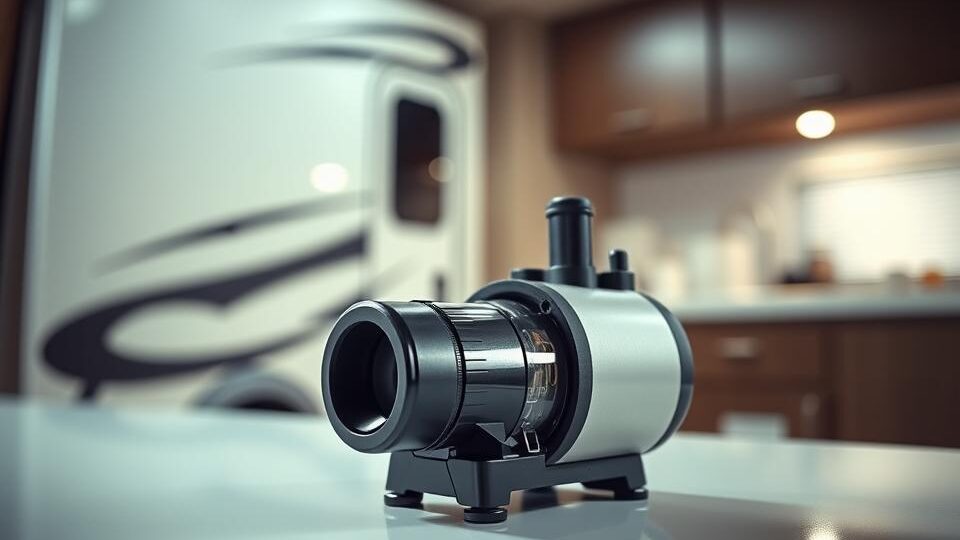
Hosting a China Lake Camper Septic Pumping Workshop
Replacing a Septic Tank Pump: Your Guide
Ever wondered about the fallout of a Septic Tank Pump failure? For many, it’s a situation that brings major stress and surprise expenses. Realizing the necessity for immediate replacement is vital in keeping a working and safe Septic system. By sticking with consistent system checks, including immediate repair needs, you increase your system’s life while preventing pricey emergencies. Companies like All in Sanitation serve a pivotal part in ensuring your Septic tank working efficiently. This guide offers a clear understanding of Septic Tank Pump replacement, detailing indication signs and care advice for RV black tank pump.
Significant Points
- Comprehending the purpose of a Septic Tank Pump is important for homeowners.
- Prompt Septic Tank Pump replacement can cut future costs.
- Scheduled upkeep and cleaning are central to extending the lifespan of your Septic system.
- Qualified service can successfully tackle Septic system Pump repair and maintenance.
- Catching early signs of Pump failure can ward off pricey restoration.
Septic System Basics
A Septic system is important for homes without access to public sewers. It processes and removes household wastewater responsibly. The Septic tank is integral to this system’s functioning, playing a vital role in the process.
The Septic tank receives sewage, separating solids from lighter materials. This separation is crucial for effective wastewater treatment. The treated water then enters the drain field, where it undergoes further cleansing by the soil, preserving groundwater.
Understanding how your Septic system works can improve its life and efficiency. Consistent care is important for the Septic tank and the system’s overall condition. Homeowners must understand their system’s details to reduce ecological impact and bypass costly repairs.
What is a Septic Tank?
A Septic tank is a in-ground, sealed container critical for household waste management systems. It’s necessary to grasp the Septic tank’s main function: it manages sewage waste storage by processing it. This setup works by isolating solids from liquids, supporting basic wastewater treatment and sanitation.
Its operation hinges on naturally occurring microorganisms that digest waste. In areas without centralized sewage treatment, Septic tanks are necessary. They keep sewage long enough for solids to settle, forming sludge. Meanwhile, liquid effluent rises to the top, making way for filtration in the drainage field.
Keeping a Septic tank in good condition is essential for its performance and life expectancy. Routine care is central to preventing issues like backups and overflows. These issues can result in pricey restorations and pose environmental hazards. In essence, Septic tanks play a significant role in ensuring hygiene and safety, especially in rural areas.

Signs You Need a Septic Tank Pump Replacement
Homeowners should be conscious of signs that their Septic tank may need a new Pump. A definite sign is experiencing foul odors near drains or in the garden, signaling a system failure. Suffering regular or major sewage backups in your home demands urgent action to avoid worse issues.
Experiencing slow draining drains signals a potential problem. Sinks, showers, or toilets that empty slowly might mean a Pump failure or a clog needing an expert’s evaluation. Additionally, areas of excessively lush vegetation in your yard could indicate trouble; this reveals waste leakage, resulting in overflow concerns.
To prevent big and costly fixes, homeowners should address these indications quickly. Carrying out regular inspections and maintenance is key for the Septic system’s top function.
| Signs | Description |
|---|---|
| Foul Odors | Unpleasant smells around drains or yard indicating system failure. |
| Sewage Backup | Frequent backups in sinks or toilets pointing to potential Pump issues. |
| Slow Draining Drains | Fixtures draining slowly can indicate blockages or Pump malfunction. |
| Lush Vegetation | Areas of dense greenery near the tank suggesting possible overflow. |
Pump Replacement Frequency
Understanding the timing for replacing your Septic Pump is vital for a efficient Septic system. It’s recommended to have your system assessed every three years. A qualified technician during these checks gives feedback into how well your system functions.
Usually, cleaning the Septic tank becomes essential every five years. However, households with greater water use or a higher occupancy might need more frequent servicing. Proper care of your Septic system prevents expensive fixes and lengthens its lifespan. Professionals in Septic services can develop a maintenance plan that aligns with your needs and the specifics of your system.
Remaining prepared with Septic Pump replacements ensures your system’s optimal functioning and defends your home investment. Periodic evaluations and service prevent unforeseen costs. They keep your Septic system working smoothly.
Understanding Pump Replacement Costs
The Septic Pump replacement cost fluctuates, influenced by many aspects. Homeowners should anticipate spending between $500 to $1,300 for a new Pump. This price bracket covers changes in the kind of Pump and material needs. It’s crucial to account for the Pump and Septic tank servicing costs for the placement and obligatory inspections.
Costs can also increase due to complications within the Septic system or area labor costs. Needed fixes, resulting from wear or harm, could raise the total outlay. In assessing financial estimates for Septic services, factor in charges for regular upkeep, checks, and any unforeseen emergencies since these factors strongly support maintaining your system’s longevity.
Budgeting for periodic Septic service diminishes the burden of unexpected bills. Proactive budgeting supports property owners in covering expenses related to the Pump’s replacement and system upkeep.
Steps in Pump Replacement
The Septic Tank Pump replacement commences with a comprehensive inspection of the system. This preliminary check finds any additional issues besides the Pump itself. The existing Pump is then removed safely and efficiently.
Installing the new Pump involves exact care to leak-free joints, verifying no leaks. Qualified technicians make certain the installation is carried out right, lessening future issues.
The final step is a comprehensive post-installation check. It checks peak operation, providing homeowners security. With skilled support, the process is simple, with little disturbance.
Septic Tank Pump Installation Best Practices
When handling Septic Pump installation, it’s important to stick to best practices. Engaging skilled professionals ensures compliance with local regulations. They expertly manage the installation intricacies, preventing errors common in inexperienced setups.
Adhering to exacting Septic service standards is important for harmonious performance. Choosing appropriate components and quality materials extends the Pump’s life and optimizes the Septic system’s efficiency. This careful focus improves maintenance and overall performance longevity.
- Go with a well-reviewed service provider who specializes in Septic systems.
- Confirm that all necessary permits and inspections are in place before work kicks off.
- Install Pumps that match the specific requirements of your Septic system.
- Incorporate a pre-installation inspection to evaluate site conditions.
- Account for the layout and flow of the Septic system during installation.
Following these guidelines creates a trouble-free install. It also secures a steady system for effective waste management.
Maintenance Advice
Avoiding high bills with your Septic system starts with routine care. By using easy guidelines, homeowners can preserve their Septic systems’ efficiency. Scheduling consistent assessments is a good idea. It helps identify and tackle problems before they become major.
It’s also important to avoid flushing damaging substances down the drain. Oily residue, chemicals, and items that don’t break down can injure your system. Cutting water use during high-usage times can also improve system handling.
Scheduling expert services with entities like All in Sanitation is crucial for Septic health. Understanding what you ought and ought not do with your Septic tank can significantly prolong its lifespan and secure your household environment.
Cleaning Your Septic Tank
Regular Septic tank cleaning is vital for your system’s long-range function and efficiency. The process comprises extracting sludge, looking for issues, and verifying everything runs smoothly. These steps are necessary to support reliable function and prevent expensive fixes.
A comprehensive Septic maintenance plan should feature routine reviews and cleanings that match your specific household requirements. Homeowners must recognize the importance of timely maintenance to sidestep difficulties like backups. Hiring experts guarantees the cleaning is thorough, promoting a hygienic home.
| Service Type | Frequency | Benefits |
|---|---|---|
| Pumping | Every 3-5 years | Wards off system failure and backups |
| Inspection | Annually | Identifies potential issues early |
| Maintenance | As needed | Extends the lifespan of the system |
Spending on routine Septic tank cleaning reduces expenses and lengthens your system’s life. It keeps the waste management system working without issues. Starting today secures your Septic system’s efficiency for the future.
Choosing a Replacement Service
Locating a trustworthy Septic service provider is crucial when replacing a Septic Tank Pump. First, checking their certifications and licenses. Such credentials demonstrate the company’s compliance with industry norms, vital for a trouble-free replacement process.
Examining customer reviews is also a key step. Past feedback indicates service quality, guiding the filtering process. Opt for companies with a strong track record of excellent workmanship and customer support.
Listen to recommendations from your network too. Insights from friends and neighbors can unveil top-notch Septic services in your vicinity. Always ask for detailed instances of their satisfactory experiences with these services.
Finally, compare the work scope and cost from various firms. A detailed analysis guarantees exceptional service and enhances the value of your expenditure. Observing these guidelines assures your Septic system receives the top-notch care it requires.
When to Consider DIY vs. Professional Help
Homeowners often find themselves pondering whether to address Septic issues personally or bring in professionals. DIY Septic maintenance looks attractive for simple fixes and upkeep. For example, checking tank levels or clearing drainage lines can be done without expert intervention.
In contrast, recognizing when to hire Septic professionals is critical for grave issues. Heavy-duty repairs, replacing systems, or major clogs demand special tools and expertise. Without the correct equipment, attempts to repair these problems can cause environmental risks and extensive damage.
Determining between DIY and professional help involves judging the job’s complexity. Presented below are examples highlighting when DIY is acceptable and when professional Septic services are recommended:
| Situation | DIY Feasibility | Need for Professional Help |
|---|---|---|
| Routine maintenance (e.g., tank level checks) | Yes | No |
| Minor clogs in drain fields | Yes | No |
| Major Septic Tank Pump failure | No | Yes |
| Complex sewage backflow issues | No | Yes |
| Regular system inspections | Possible DIY | Yes for thorough checks |
Making informed decisions on these matters guarantees safety and efficiency. Choosing correctly both protects and preserves the Septic system but also avoids sudden charges.
To Conclude
Knowing the workings of your Septic system is vital for its sound handling and your home’s efficiency. Identifying initial signals of issues stops high repair bills and protects the system’s integrity. This forward-thinking approach supports the environment and raises your property value.
To preserve your Septic system in excellent condition, make sure of maintenance. This includes periodic reviews and scheduled professional Pumping. This small outlay protects your home’s safety and your health. Your Septic system operates smoothly with diligent attention.
Our team at All in Sanitation is committed to delivering first-rate Septic care. We bring the expertise necessary to guarantee your system running at peak, safeguarding your home investment over time. With our dedication to quality service and trustworthiness, we’re here for your Septic maintenance needs.